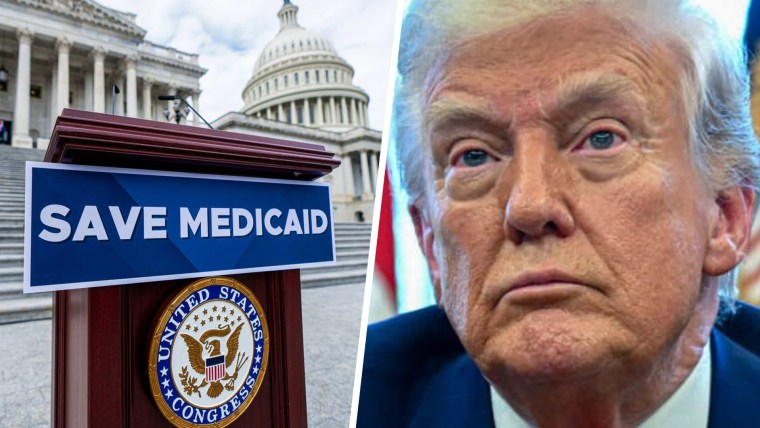Congressional Republicans' idea of giving every newborn a $1,000 investment account is an obvious political ploy that doesn't nearly make up for the damage that President Donald Trump's other policies are doing to working-class families. The proposal is half-hearted, the amount is too small and the name of the accounts is unecessary.
But it's still a good idea.
Under the "big beautiful" spending bill passed by House Republicans early Thursday morning, every baby born from the start of this year to Dec. 31, 2028 would receive $1,000 that would be invested on their behalf in financial markets in a special new account named after Trump.
The recipients could withdraw the money later in life for certain expenses such as paying for college, buying a house or starting a small business.
Let's work through the objections first. First, like the "senior bonus," the so-called Trump Accounts are clearly meant to distract from the fact that the Republican bill would cut food assistance for hungry children, kick millions of Americans off Medicaid, reduce taxes on the wealthy and raise them on the poor, and blow a $3 trillion hole in the deficit, possibly leading to the end of American economic dominance.
To which my response is: Yeah, and?
The fact that it's an obvious political gimmick doesn't really affect whether or not it's a good idea. Neither does the fact that it's tucked into a bill that is otherwise bad. In fact, the proposal borrows the basic framework from a "baby bonds" proposal that Democratic Sen. Cory Booker and Rep. Ayanna Pressley pushed unsuccessfully throughout President Joe Biden's administration that was widely praised on the left as a way to reduce the racial wealth gap while boosting working-class families of all races.
Under the Booker-Pressley proposal, every child would get $1,000 in a savings account and as much as $2,000 more each year up to age 18, depending on the family's income. By contrast, the Trump accounts only include the initial $1,000 deposit, though parents could add up to $5,000 a year of their own money up to age 18.
Those seemingly minor changes make a huge difference.
If a lower-income family added no money to their Trump account, after 18 years that $1,000 would have grown to around $2,000, if we assume a generous 4% rate of return. That's about enough to pay for textbooks, maybe, but not college. Even if they waited until age 30 to use it to buy a house or start a business, it would still only be around $3,000, which would cover your title fee and some other side costs, but otherwise not help much.
By comparison, a poor kid with a Booker-Pressley account would have more than $50,000 at age 18 and more than $85,000 at age 30 — literally life-changing amounts of money.
Not only do the proposed Trump Accounts not help poor kids, they might actually disadvantage them further.
By allowing parents to contribute, Trump Accounts would end up helping wealthier families more. Assuming a family put the maximum $5,000 per year into the account, that would add up to more than $130,000 at age 18 and more than $210,000 at age 30. You can't necessarily call those life-changing amounts, however, since the only kids who end up with that much are those whose parents already had enough means to set aside $5,000 a year.
It's not clear wealthy families even need this. They can already put money in 529 college savings plans, private investment accounts for minors and even custodial accounts for bonds on TreasuryDirect.
The Trump Accounts would also only be available to newborns who are U.S. citizens whose parents both have Social Security numbers. (As it's written now, this only applies if the parent claiming the credit is married.) This seems clearly aimed at making it harder for immigrants to qualify — especially since the Trump administration is currently in court arguing against the constitutional guarantee of birthright citizenship and reportedly tried to strip Social Security numbers from thousands of immigrants.
The name is also distasteful to many Democrats. Originally called MAGA Accounts (supposedly for "Money Account for Growth and Advancement," which is up there with "chai tea" and "ATM machine" for redundant names), they were renamed Trump Accounts at the last minute, sparking complaints from House Democrats that the GOP would be "screaming bloody murder" if they had tried to name savings accounts for President Barack Obama.
So, to recap: The proposal would do little for poor kids and give wealthy families yet another government-approved investment account while providing some political cover for a massively regressive spending bill that will damage America's long-term future. Oh, and the $1,000 payments for newborns would stop right as Trump is leaving office.
Still, I say it's a good idea. Here's why.
The biggest mistake that both Republicans and Democrats make when considering a proposal from the other side is to treat it as static. Good ideas often start as bad ones, and good policies often grow out of flawed ones. When it started in 1935, Social Security didn't cover agricultural or domestic workers, which meant it disproportionately excluded African Americans. But over time, it was expanded. Today, it is more fair — and actually helps Black and Hispanic workers more due to the way benefits are structured.
The four-year time limit might even be a blessing in disguise, as it gives the next president an obvious demand to "extend the Trump Accounts" while tinkering with them to make them more like the Booker-Pressley baby bonds. If they're smart, they'll even leave the Trump name on them, to make it that much more painful for Republicans to vote against the extension. The fact that they began under a Republican president will also make it easier to respond to wild claims of "socialism."
Like the kids they're meant to help, the Trump baby bonds are still in their infancy. But one day, they might grow up to be something great.

